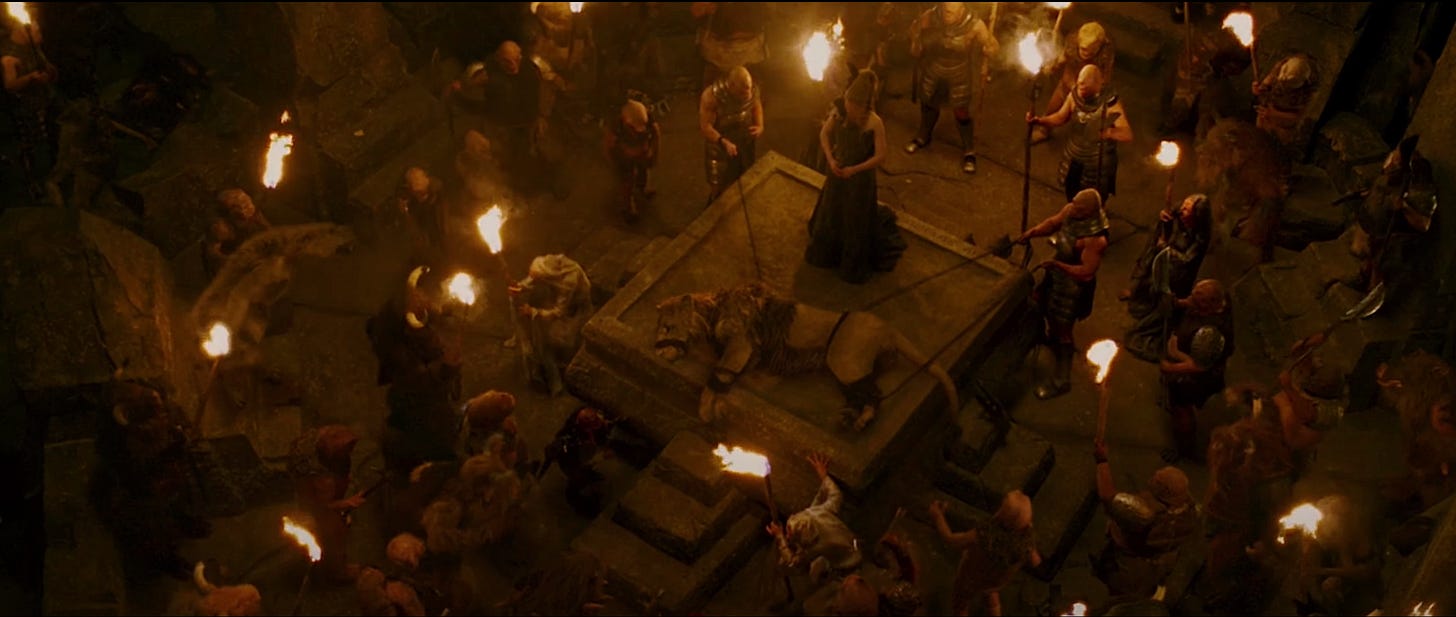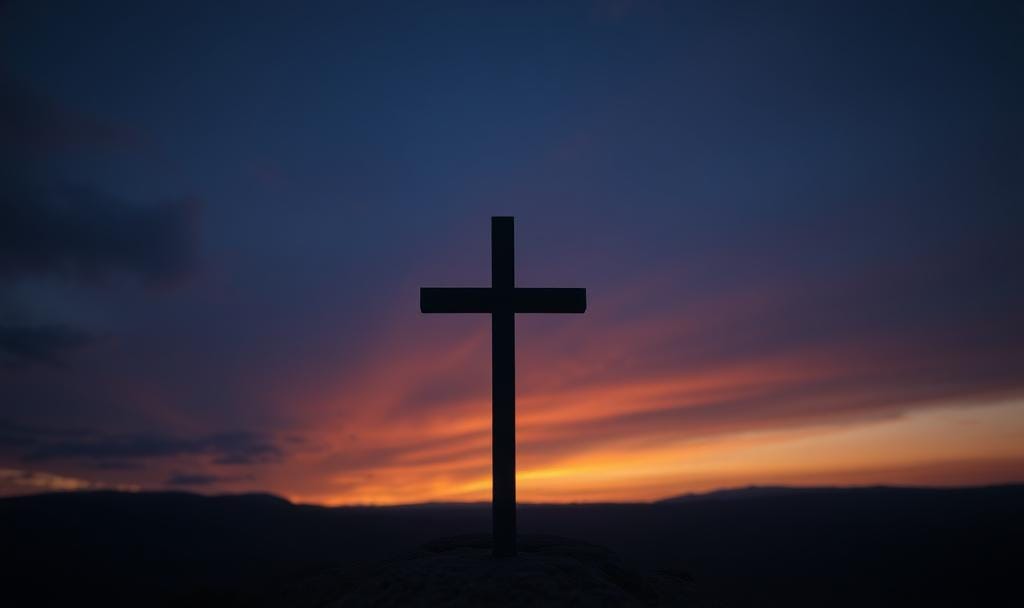Our Hope Today and Tomorrow
Words of grace for tired, struggling and imperfect people
In C.S. Lewis' beloved chronicle of Narnia "The Lion, the Witch and the Wardrobe", we encounter sacrifice and resurrection. The great lion Aslan, ruler of Narnia, willingly surrenders himself to the White Witch in place of Edmund, who had betrayed his siblings and aligned himself with evil. In the cold darkness of night, at the ancient Stone Table, surrounded by the Witch's monstrous followers, Aslan is humiliated, bound, and finally killed. Lucy and Susan, who secretly witness this terrible event, spend the night weeping beside his lifeless body, and at this moment, it indeed feels as though all hope is lost.
But as the sun rises over Narnia, death is undone. The Stone Table cracks. Aslan returns not just alive, but more powerful and more glorious than before. His resurrection breaks the witch's magic, frees the petrified creatures of Narnia, and ushers in the fulfillment of the ancient prophecy that ends the long winter. Winter's grip on Narnia—a hundred years of cold, barren darkness—finally gives way to spring as Aslan leads the children and his followers into a battle for victory and a new day and a restored kingdom.
When asked how this miracle was possible, Aslan explains that the White Witch knew the “Deep Magic”, which demanded a traitor's blood. But what she failed to understand was the “Deeper Magic” from before the dawn of time – that when a willing, innocent victim is sacrificed in our place, death itself is undone.
Through this story, Lewis was trying to reflect a greater reality, for it points us to the central truth of the Christian faith:
The Crushing Price
Before we can truly grasp the victory of resurrection, we must understand the devastating cost that made it possible. Isaiah, writing centuries before Christ's birth, describes this cost in what many call the "Suffering Servant" passage:
"Yet it was the LORD's will to crush him and cause him to suffer, and though the LORD makes his life an offering for sin, he will see his offspring and prolong his days, and the will of the LORD will prosper in his hand. After he has suffered, he will see the light of life and be satisfied; by his knowledge my righteous servant will justify many, and he will bear their iniquities." (Isaiah 53:10-11)
These sobering words reveal a truth that challenges our comfortable understanding of salvation. The Father did not merely allow his Son to die—he actively willed it. The text says plainly, "it was the LORD's will to crush him and cause him to suffer." This is no mere passive permission, but divine purpose. God's holy wrath against sin—the righteous anger that demands justice—was poured out in full measure upon his beloved Son, for us.
Why would a loving Father do this? Isaiah provides the answer: "though the LORD makes his life an offering for sin." Jesus became our sin offering, taking upon himself the punishment we deserved. The cross was not primarily a display of Roman cruelty, but the place where divine justice and mercy met. There, Jesus bore the full weight of God's wrath against sin so that we would never have to.
This was no easy or simple transaction. The Father "crushed" the Son. The original Hebrew word conveys the idea of being utterly broken, shattered, or pulverized. On the cross, Jesus experienced not only physical torture but spiritual abandonment—the agony of bearing sin and being separated from the Father. As he cried out, "My God, my God, why have you forsaken me?" he tasted the bitter cup of divine judgment to its dregs.
Yet this crushing was not the end of the story. Isaiah continues, "After he has suffered, he will see the light of life and be satisfied." Here we find the prophetic glimmer of resurrection, 500 years before Jesus. The suffering servant would not remain in death but would "see the light of life"—he would rise again. And in this resurrection, he would be "satisfied"—the work of redemption complete, the price fully paid.
Between the Cross and the Crown
Having grasped the devastating cost of our salvation—the crushing weight that Christ bore on our behalf—and glimpsing the glory of His resurrection, we now face the question: How should these twin realities reshape our lives today?
The resurrection isn't merely a future hope that we passively await. Rather, it draws a line from Christ's finished work on the cross through our present struggles to our future glory, giving meaning and power to every moment in between. The same Father who was willing to crush His Son for our redemption now offers us the resurrection power of that Son for our transformation.
When we truly understand both the cost of our salvation and the promise of resurrection, generosity becomes natural. We can sacrifice freely and gladly—whether our time, our money, our energy, or whatever we have—knowing that we will be well repaid in the resurrection. The One who surrendered everything for us inspires us to hold our possessions loosely.
This forward-looking perspective changes how we see others. Even the brother or sister with whom we struggle to get along, we can remember that soon they will rise perfected in Christ and we will enjoy fellowship with them. For those who don't know Christ, we're moved with sincere desire for their salvation, wanting them to share in the blessed resurrection and be saved from the condemnation that Christ himself experienced in their place.
Our view of creation itself is transformed. When we see this beautiful yet broken world, we strive to love and take care of it, while having the sure hope of its restoration as "creation itself will be released from the curse at the resurrection" (Romans 8). The crushing that came through sin will give way to flourishing through resurrection.
The promise of resurrection also strengthens us in our fight against sin. It maintains our urgency as we know judgment is coming—the same holy wrath that fell on Christ—while simultaneously reminding us that we will be ultimately delivered from our sins. Even now, we share in the power of the resurrection in our daily struggle against sin.
The resurrection frees us from the cultural pressures around us—"making your dreams come true, finishing your bucket lists, or enjoying a life of ease and pleasure." The resurrection assures us that we will know "an eternal and abundant life so great that it is not worth comparing to the pleasures of this life.".
The Comfort of Resurrection Hope
As powerful as the resurrection is for our future hope, it also provides immediate comfort in our present struggles. "For to this end we toil and strive," wrote Paul, "because we have our hope set on the living God, who is the Savior of all people, especially of those who believe" (1 Timothy 4:10).
The most obvious way the resurrection strengthens us is by giving us confidence in the face of death, knowing that it is not the end. Whether we face martyrdom or die peacefully at a good old age, death can be faced without fear and with joy because of the resurrection.
For those who are sick—chronically or terminally—the resurrection promises that even if there is no miracle of healing now, you will rise from the dead imperishable and immortal unto everlasting life and happiness with Christ.
For those who feel crushed by failure—whether in academics, careers, relationships, parenting, or any other arena of life—the resurrection promises a complete transformation. In the resurrection, you will have a perfect mind free from error, a perfect body no longer subject to weakness, and perfect desires that fully align with God's will. Your past failures will be utterly eclipsed by the glory of your new existence in Christ. Yet your scars, like His, will remain not as reminders of defeat but as testimonies of divine restoration—evidence of the journey from brokenness to wholeness through His redemptive power.
The lonely will be welcomed into God's community. The poor will receive an abundant inheritance. Those who are slandered or despised will be vindicated at the judgment. Those who feel their efforts are futile will never labor in vain again.
As we face life's challenges and uncertainties, the resurrection fuels our worship and trust in God's providence. We praise God for His grace in promising and securing our eternal future. We can trust that whatever providence God has for our lives—however seemingly light or difficult—He is working all things for our good for all eternity.
This is not wishful thinking or me trying to wrangle comforting words. This is really going to happen to you, Christian. The same power that raised Christ from the dead is at work in you, guaranteeing that your story—whatever its current chapter holds—will surely end in glory.
Credits and References
Book: “The Lion, the Witch and the Wardrobe” by C. S. Lewis
Sermon: “The End for Which God Created the World” by Jonathan Edwards
Sermon: “The Resurrection: Our Perfect Hope, Our Great Confidence” by Matthew Haak @ Grace Church Amsterdam






